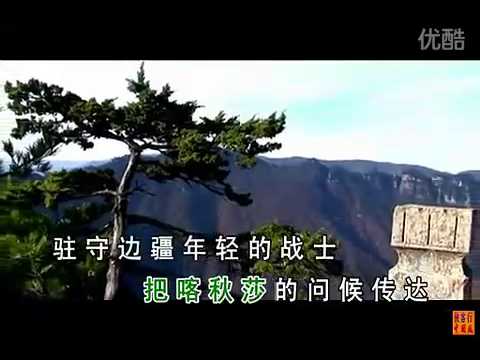Katyusha (Russian patriotic song)
The most beautiful song.
(translation by Ivan Pozdeev, 2023) Расцветали яблони и груши Поплыли туманы над рекой Выходила на берег Катюша На высокий берег, на крутой Выходила, песню заводила Про степного, сизого орла Про того, которого любила Про того, чьи письма берегла Ой, ты, песня, песенка девичья Ты лети за ясным солнцем вслед И бойцу на дальнем пограничье От Катюши передай привет Пусть он вспомнит девушку простую Пусть услышит, как она поёт Пусть он землю бережёт родную А любовь Катюша сбережёт
Apple and pear trees blossomed, Mists flew over the river. Katyusha went out onto a river bank, Onto a high and steep river bank. She went out and started a song About a grey steppe eagle, About the one she loved, About the one whose letters she kept dear. Oh, you, the song, the girl's song! You fly out trailing the bright sun, And to a soldier at a distant border, Send him cheers from Katyusha. Let him remember a plain, simple girl, Let him hear her singing, Let him keep the Motherland safe, And Katyusha will keep the love safe all right.
About the Song Katyusha
“Katyusha” (Russian: Катюша [kɐˈtʲuʂə] — a diminutive form of Екатерина, Ekaterina — Katherine), also transliterated as “Katûša”, “Katusha”, “Katjuscha”, “Katiusha” or “Katjusha”, is a Soviet folk-based song and military march. It was composed by Matvey Blanter in 1938. The author of the lyrics to the song “Katyusha” was the Soviet poet Mikhail Isakovsky. This song gained fame during World War II as a patriotic song, inspiring the population to serve and defend their land in the war effort. The song was still popular in Russia in 1995. The song is the source of the nickname of the BM-8, BM-13, and BM-31 “Katyusha” rocket launchers that were used by the Red Army in World War II.
The song is about a Russian woman called Katyusha. Standing on a steep riverbank, she sends her song to her beloved, a soldier serving far away. The theme of the song is that the soldier will protect the Motherland and its people while his grateful girl will keep and protect their love. Its lyrics became relevant during the Second World War, when many Soviet men left their wives and girlfriends to serve in World War II, known in Russia as The Great Patriotic War. Many of the men never returned home, with an estimated 8,668,400 Soviet military deaths.
(2022-04-13 [Katyusha (song)]
https://en.wikipedia.org/wiki/Katyusha_%28song%29 )
Katyusha Piano

- https://youtu.be/2pW6z8DOMyc
- Katjusha 2 (Russian Folk Song Piano Version)
- Karl Sternau
- Mar 28, 2016

- https://youtu.be/gEUGYy4tULE
- КАТЮШA (Katyusha) - Piano Cover
- mk-san
- Jun 10, 2018

- https://youtu.be/G5jFgqz34GQ
- Katyusha - 5 Variations
- muelsak
- Apr 19, 2020
Club Dance Version
- Katyusha (Russian patriotic song) in chinese dance club. https://x.com/Sprinter99880/status/1670212954480943109

- https://youtu.be/cAU_Mf2A7aA
- Katyusha Song (Hephex Remix)
- Hephex
- Jan 24, 2023
Vocals
- love russian https://www.youtube.com/shorts/TCBRiFwjjZM
Girls and Tanks Anime
Katyusha, Chinese Version 喀秋莎
喀秋莎 Katyusha 正当梨花开遍了天涯 河上飘着柔曼的轻纱 喀秋莎站在峻峭的岸上 歌声好像明媚的春光 姑娘唱着美妙的歌曲 她在歌唱草原的雄鹰 她在歌唱心爱的人儿 她还藏着爱人的书信 啊,这歌声姑娘的歌声 跟着光明的太阳去飞吧 去向远方边疆的战士 把喀秋莎的问候传达 驻守边疆年轻的战士 心中怀念遥远的姑娘 勇敢战斗保卫祖国 喀秋莎爱情永远属于他 正当梨花开遍了天涯 河上飘着柔曼的轻纱 喀秋莎站在峻峭的岸上 歌声好像明媚的春光

- https://youtu.be/M3dy7wEM_lw
- katyusha in chinese. karaoke